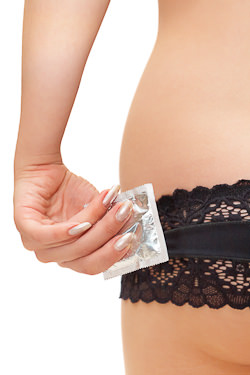
Herpes is one of the most dreaded and misunderstood STI's. If you have multiple partners it is highly likely that you already have herpes or will contract herpes. It is important to be aware of the risks and the consequences of non-monogamy, but the effects of this virus really are minimal.
Herpes is a virus transmitted by skin to skin contact through kissing, oral, vaginal and anal sex. There are 2 types. HSV1 usually causes cold sores on the mouth but can cause genital sores as a result of oral sex. HSV 2 causes genital sores and very rarely cold sores. Types 1 and 2 are separate viruses; HSV1 can not become HSV2, or vice-versa. Herpes is not life-threatening, except in the case of newborn infection. It is however, a life-long condition.
One in 4 women, and 1 in 5 men have HSV2. 60-80% of people have HSV1. It is entirely possible that you have one or both types regardless of your sexual history. Unless you have recent blood work showing you are negative for HSV you could have herpes. If you have ever had a cold sore or fever blister you have herpes.
The most common symptom of HSV2 is no symptom at all. 90% of people who are infected do not know they have herpes. These people are asymptomatic carriers. They may never have an outbreak, but they can pass the virus on to their partners. 70% of new cases are spread by people with no symptoms.
HSV of both types causes blister-like bumps on the penis, scrotum, thighs, anus, vulva, vagina or groin area. The location of the blisters does not indicate the point of entry for the virus. The entire area shares the same nerves and the virus travels along these nerves. Therefore, you could have anal sores, but never have had anal sex. The blisters can occur for the first time within 2 days of exposure or up to decades later. The blisters may be painful or itchy or you may just think they are insect bites or ingrown hairs. The blisters open and then scab over after a few days to two weeks. The scabs resolve and normal skin without scarring is the final result. On the vulva or vagina the blisters do not scab, but are replaced with normal skin. The first year people typically have 4-6 outbreaks if they have HSV2 genital herpes and less if they have HSV1 genital herpes. As time goes on the frequency decreases.
If a person has oral HSV1 they can spread it through kissing on the mouth or by giving oral sex. The most contagious time is when there is an active sore. However, herpes is always present in the body and may be active on the skin even when there are no symptoms. Children are especially susceptible to HSV1 and many people contract it through simple friendly kisses from adult family members. Adults usually require deeper kissing to pass HSV1 by mouth.
If a person has HSV2 they can spread it through vaginal or anal sex. It is most contagious when the blisters are present, but the virus can still be present when there are no symptoms.
Used towels can transmit herpes because they are warm and moist. You should not share towels. Washing towels kills the virus.
Hot tubs, swimming pools and toilet seats do not transmit HSV.
Testing:
Most people don't know they have herpes. If you have not specifically asked for HSV testing you probably haven't been tested. Having STD testing, donating blood or being in the military doesn't mean you've been tested.
If you have a sore in the groin area you should not pick at it and you should not have sex. You should see a health care provider as soon as possible. Testing does not work as well after the sores have been present more than 2 days. So if the sore is not new the test may indicate that you don't have herpes when in fact you do. You should ask your provider to type the culture so you will know which type of herpes you have.
If you have no symptoms, but have ever had oral, vaginal or anal sex you could have herpes. A blood test can tell you if you have herpes and which type. The blood test may be negative if you were recently infected. It takes between 3 days and 3 months for the test to be positive after exposure. The test looks for antibodies in the blood to herpes. This means you have herpes in your system and your body recognizes it. You can not just have antibodies, but not the virus. If you have antibodies to herpes then you have herpes in your body. Since it can take awhile for a test to be positive, a person with symptoms can have a positive culture, but a negative blood test. This means the exposure was more recent.
Most medical professionals do not recommend herpes testing for people who do not have symptoms. The test is expensive. If the test is positive it is difficult to make a decision about how to deal with a non-symptomatic infection.
Treatment:
Herpes is not curable, once you have it you will always have it. You may never have an outbreak, but the virus is still present in your body.
Antiviral medications are used to treat herpes. They can reduce the length and severity of an initial outbreak. Taken daily, they reduce the frequency of recurrent outbreaks and reduce the asymptomatic shedding of virus, thereby reducing transmission to you partners.
Risk:
If someone has active sores they should not be having sex. Herpes can still spread without active sores. HSV1 genital herpes has less viral shedding, so theoretically is less contagious than HSV2.
If both partners have HSV2 genital herpes, or both have HSV1 genital herpes there is no risk of further genital herpes spread. There is a minimal risk of spread to the mouth with oral sex when both partners have HSV1. HSV2 oral infections are not common.
If one partner has genital HSV1 and the other has oral HSV1 transmission is unlikely. The immune system is already active against HSV1 so the spread is very rare.
If one partner has genital HSV1 and the other has genital HSV2 there is a risk of the HSV1 partner becoming HSV2 positive, but almost no risk of the HSV2 person contracting HSV1.
Having HSV1 does offer some immune protection against acquiring HSV2.
Sorry this section was complicated. Basically, 80% of people our age have HSV1 and 20-25% have HSV2. If you have a limited sexual history and no history of cold sores you are at higher risk for HSV1 (oral or genital) and HSV2. Already having the virus offers protection.
Prevention:
Condoms reduce transmission by 50%. If the individual with herpes takes daily antivirals this reduces transmission by an additional 50%.
In studies of couples having sex 2 times a week for one year, where one partner has hsv2 and the other does not, without condoms and medication 4% of men and 8-10% of women will become positive. With condoms and medication only 1% of men and 2-3% of women become positive.
Playing with someone who has herpes and takes medication and uses condoms is much less risky than playing with someone who has herpes, but doesn't know it. (90% of people with HSV)
For the majority of people there are no symptoms. For people who do have symptoms, the first episode may be painful, but recurrences are more of an annoyance than a real problem. Medication can control recurrences and help prevent the spread. The only exception is women who have an outbreak at the end of pregnancy and people who contract herpes in the eye area (rare). Herpes is very dangerous to newborns.
Overall, the stigma of herpes is much worse than the actual virus.


2 Comments
Thank you for this article. About 3 days ago me and my husband had a threesome with a girls with hsv2. She didn’t told us after, that was tough to hear and selfish on her part.
She says she takes antivirals and my husband used a condom. I know the risk of transmission is low. But still, we are afraid. Thanks for this post. I see you did your homework and are informing us well. I’m also a health educator, which helps me understand all this, but is still stressful. I which she would have been upfront.
I totally would feel the same way you are. I will tell you that someone on antivirals is almost non-transmissible, so there is very unlikely to be anything to worry about. That said, though, again, I understand your fear.